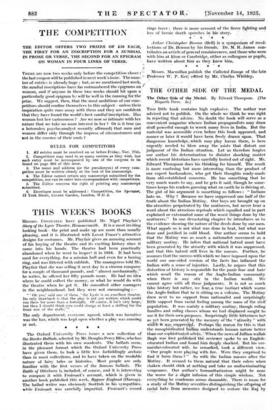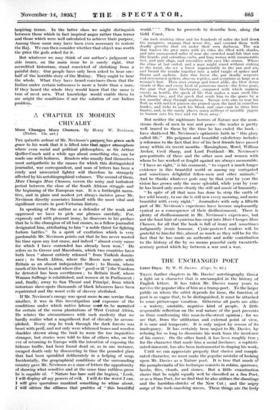THE OTHER SIDE' . OF THE MEDAL
The Other Side of the Medal. By Edward Thompson. (The . HOgarth Press. 5.s.) Tins little bOok contains high explosive. The author was advised not to publish. 1 On the whole we think he was right in rejecting that advice. No doubt the book will serve as a
convenient magazine whence Indian propagandists may draw stuff powerful enoughto wreck .many lives in India. But the material was -accessible ,even. before this book appeared, and sooner or later it would have been freely drawn upon. That dangernits- knowledge, which may play havoc there, is here urgently_ needed to blow away the "mists that distort our judgment of the Indian. situation. Let us, therefore forgive our author his determination to disinter "shocking matter which recent historians have carefully. buried out of sight. Mr. Edward Thompson does his thinking for himself. The result is more Confusing but more interesting than the product of
Our, expert bookmakers, who get their thoughts ready-made from old-established concerns. He has something that he very much wants to say, and he gets it said, though he some- times keeps his readers guessing what on earth he is driving at.
The gist of his argument is something as:follows : "Indians
hate us. Why ? Because we have suppressed one half of the truth about the Indian Mutiny.. Our boys are brought up on the atrocities perpetrated by the mutineers, but never hear a word about the atrocious reprisals which equalled and in part explained or extenuated Some of the worst things done by the Mutineers." In One -devastating chapter he introduces us to the evidence showing the nature of the deeds done by our men. - What appals us is not What was done in -heat, but what was
done and justified in &old blood.. Our author Seems to hold that the Mutiny was as much a nationalist movement as a military mutiny. He infers that national hatred must have been generated by the atrocity with which it was suppressed, and that this hatred still lives in the masses. Further, he
assumes that the success with which we have imposed upon the world our one-sided 'Version of the ..facts has inflamed the Indian with a sense of injustice. 'Lastly, he argues that this distortion of history is responsible for the panic -fear and hate which assail the reason of the Anglo-Indian community when there is any stir in the Indian World. We cannot agree with all theSe. judgments. . It is not so much false history hut rather, we fear, a -true instinct which warn.s. the Anglo-Indian that he in sitting on -a s' The Mutiny' drew next to no support from nationalist and surprisingly, little -support from racial feeling aniong the mass of the civil population. It was mainly a military Mutiny, though ruling. families and ruling classes Whom we had displaced sought to use it for their own purposeS..'Surprising13-, littlCbitterñess has as yet been generated .by the Memory. of the ' ' atrocity " with whiCli watsuppreleitsi. PerhipS .IftereaStni for this is that the unsophisticated -input understands human nature better than our sophisticated SON-les...7fIVIten the news of Jallian wallah Bagh was first pufilishedilie reviewer -spoke to an English- , educated Indian and found huin decily,shaeked. But -his ver- naetdar-cducated wife,- he remarked, Wok a different View. "Our People were playing. with fire. Were they surprised to find it burn them?" So with the Indian masses after the
Mutiny. It seemed to them, natural that their rulers when shaken should stick at nothing and take an undiscriminating vengeance.. Our author's humanitarianism might be none the worse for a slight infusion of this simple wisdom. Not
everything he condemns seems- damnable: There is room for a study of the Mutiny severities .diatingUishing the offspring of _racial hate from measures designed to restore the Raj by inspiring terror. In the latter class we might distinguish between those which in fact inspired anger rather than terror and those which were well calculated to achieve their purpose.. Among these some may- have have been even necessary to restore the Raj. We can then consider whether that object was worth- the price the gods asked for it.
But whatever we may think of our author's judgment on- side issues, on the main issue he is surely right. Our accredited historians, stand convicted of shrinking from a painful duty. Our people have only been asked to hear onc- half of the horrible story of the Mutiny. They ought to hear the whole. What they have heard convinces them that the Indian under certain influences is more a brute than a man. If they heard the whole they would know that the same is true of most men. That knowledge would enable them to see aright the conditions if not the solution of our Indian probleim-
. .



























































 Previous page
Previous page